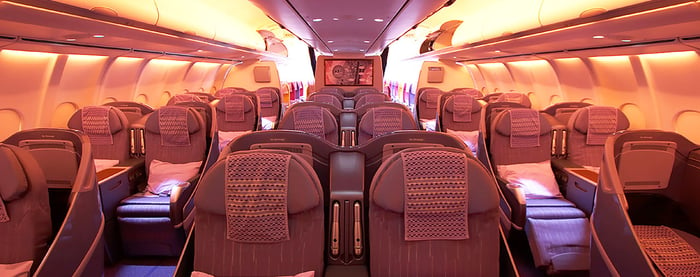Boeing (BA -0.24%) has fired another shot in its ongoing power struggle against United Technologies (RTX 0.84%) and other suppliers. On Jan. 16, it announced an in-house alternative to a key part of the commercial aircraft supply chain. Investors in Boeing and its suppliers should be watching closely.
Take a seat
Boeing is forming a joint venture with Adient (ADNT 2.89%), the auto parts business spun out of Johnson Controls in 2016, to develop and manufacture seats for commercial aircraft. Boeing said that the JV is a response to delays in seat production and capacity constraints from current suppliers Rockwell Collins and Zodiac Aerospace, and cited forecasts that the aircraft-seating market would grow from $4.5 billion in 2017 to $6 billion by 2026.

Rockwell Collins-made main cabin seating and lighting assembly. Image source: Rockwell Collins.
"Seats have been a persistent challenge for our customers, the industry and Boeing, and we are taking action to help address constraints in the market," Kevin Schemm, Boeing Commercial's supply chain and finance chief, said in a statement. "This joint venture supports Boeing's vertical integration strategy to develop in-house capabilities and depth in key areas to offer better products, grow services and generate higher lifecycle value."
The move is sure to attract significant attention from the supply base because two of Boeing's largest suppliers are already headed in that direction. United Technologies has a deal pending to buy Rockwell Collins, and engine maker Safran is acquiring Zodiac.
A supply chain tug-of-war
In September Boeing cast a skeptical eye on the UTX-Rockwell Collins deal, saying it didn't believe the transaction would benefit its airline customers and threatening to cancel some contracts with the merged company if it felt the combination undermined competition in the aerospace supply chain. The company is also very uncomfortable with the idea of any of its suppliers becoming too big and gaining significant clout in the industry.
Original equipment manufacturers (OEMs) Boeing and Airbus have both been pressuring suppliers to deliver better pricing, part of their broader battle to lower aircraft pricing and in response to investor pressure to increase margins. UTX and Rockwell Collins have billed their merger as a way to gain scale and bargaining power and counter the pressure.
The move continues a trend by Boeing to bring more manufacturing under its control. When the company announced the 787 Dreamliner last decade, it was headed in the other direction, creating a global supply chain and reducing itself to mostly final assembly. But for a variety of competitive and quality reasons, it has more recently been expanding its expertise in aviation electronics, specialty manufacturing, and engine components.
The OEMs are also realizing that by outsourcing large chunks of the manufacturing process they are surrendering the highly lucrative aftermarket revenue that comes with servicing existing aircraft. Airlines might refresh seats and interiors two to three times over the expected life of a new aircraft. Boeing is trying to grab potential revenue in an area in which it doesn't have much exposure right now.
In 2016 Boeing ended an agreement with one of its largest suppliers, former subsidiary Spirit AeroSystems, that effectively took away the business of manufacturing spare parts using Boeing intellectual property. Boeing acquired aftermarket-parts distributor Aviall in 2006, but the company in recent years has increased the attention it pays to the aftermarket.
Uneasy relationship will continue
The bottom line is that Boeing and Airbus still need suppliers like UTX, Safran, and Spirit, but the competitive tension between them shows no sign of subsiding. Every step the OEMs take into the aftermarket in areas like seating will make it all the more difficult for the suppliers to deliver outsized profits.
The highly cyclical commercial aircraft market has been going strong for an unusually long nine years now, and while the narrow-body order book in particular remains robust at both Boeing and Airbus, these moves to diversify are Boeing's way to prepare for an inevitably slowing in orders.
There's still money to be made in commercial aerospace, but it seems unlikely the next few years will be as strong as the last few years have been. Tread carefully, especially when it comes to the suppliers.





